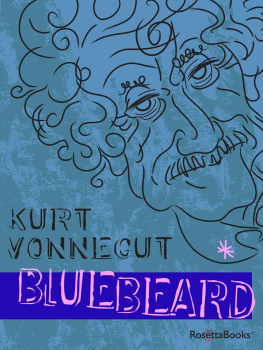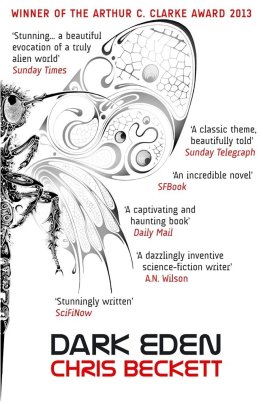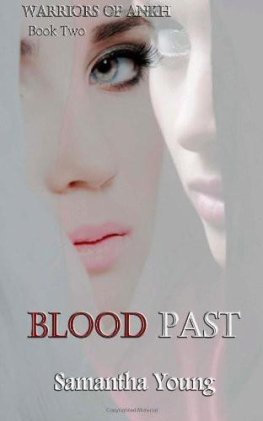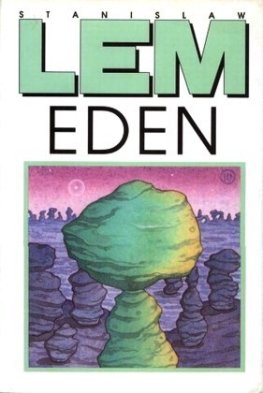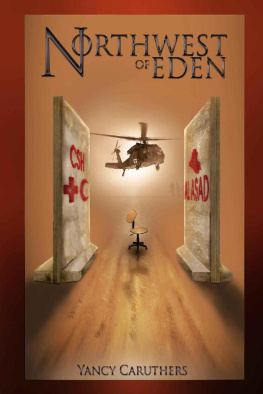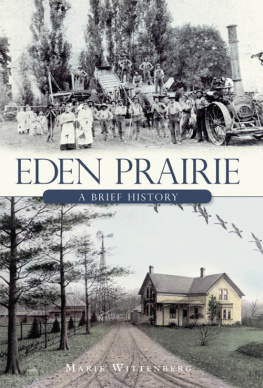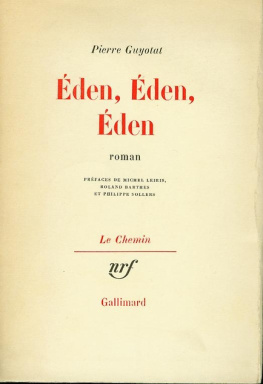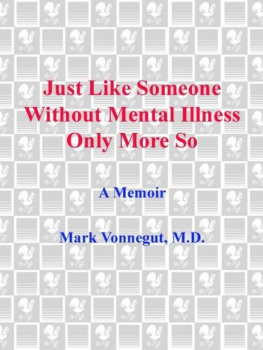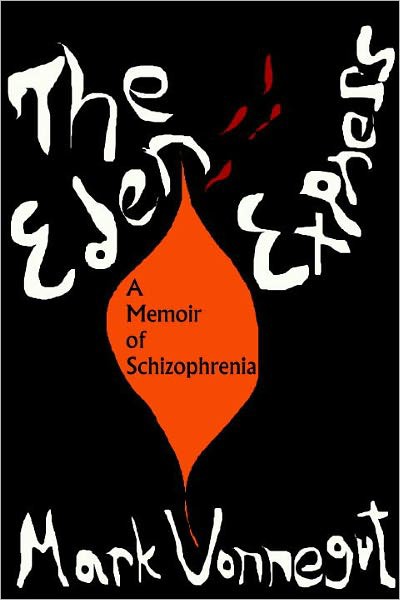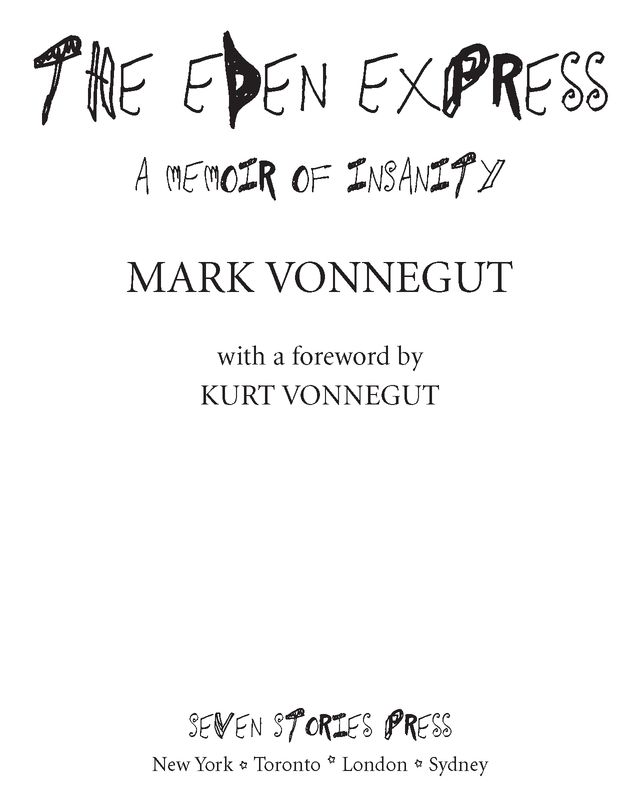Table of Contents
PRAISE FOR MARK VONNEGUTS
THE EDEN EXPRESS
A searching, vivid accountof the inside of a schizophrenic breakdown, the struggle to recover, to understand.
The New York Times Book Review
A painfully honest document of life in transition.
Time
A remarkable book.
The Atlantic
Mark Vonneguts remembrance of what it was like in the 1960s is not only a memoir about his loss of political and social innocence, and ours, but a surprisingly good-natured trip through his own head. A highly readable, touching, and affectingly vulnerable book.
Los Angeles Times
Considerable courage and endurance lie behind this unpretentious and enlightening memoir.
Publishers Weekly
His description of his schizophrenic experiences are not only convincing from a clinical standpoint but are written in an engaging style, with an admirable lack of self-pity. His story is worth reading.
Library Journal
A disarmingly open, engrossing, oddly graceful chronicle.
Kirkus Reviews
To Mark Adin Boles. If not for you I wouldnt have bothered to fight.
To my father. Without you I wouldnt have known how to fight.
To J. Ross MacLean. Without you I never would have stopped fighting.
FOREWORD
A MOVIE ACTOR TELEPHONED me a couple of years after this book was published. We had never met, but he knew my son had gone crazy and then recovered. His own son was going crazy, and he was in need of advice. He asked how my son was, and I told him Mark had just graduated from Harvard Medical School. He said, Some remission! I said, We were lucky, and I certainly hope you will be lucky, too.
That was the best I could do back then. That is the best I could do right now. Put another way: Some people survived going over Niagara Falls in a barrel. Others didnt. The turbulence is really something.
My son Marks most unsociable performance when bananas, and before I could get him into a Canadian laughing academy, was to babble on and on, and then wing a cue ball through a picture window in an urban commune in Vancouver, British Columbia. It was only then that his flower children friends telephoned me to say he was in need of a father.
God bless telephones.
Marks dear mother Jane Marie, ne Cox, now dead, a Quaker and, like Mark, a graduate of the Quaker college Swarthmore in Pennsylvania, would often tell him that he was supposed to save the world. His college major had been religion, and he had not yet considered becoming what he has indeed become, a pediatrician. One seeming possibility before he went nuts was that he study for the Unitarian ministry.
He was then twenty-two, and I myself was a mere spring chicken of forty-seven, a mere thirty-two years ago. By the time Mark and I went in a hired car from the house with the busted picture window in Vancouver to what turned out to be an excellent private mental hospital in nearby New Westminster, he had at least become a jazz saxophonist and a picture painter. He babbled merrily en route, and it was language, but the words were woven into vocal riffs worthy of his hero John Coltrane.
While we awaited Marks admission in the front lobby of the Canuck loony bin, which, one has to say, had the therapeutically unfortunate name Hollywood Hospital, Mark dug both hands into a big bowl of sand and cigarette butts. When a male nurse appeared to greet us, Mark started painting a picture with his filthy fingers on the bosom of the mans white uniform. The nurse couldnt have been nicer about that.
So Mark eventually recovered his sanity, as, so I am told, the movie actors son did not.
And I recall now a time when I pondered buying from a gift shop a pretty object sacred to believers in a faith I knew nothing about. Only kidding, I asked the woman who waited on me if she thought it would bring me bad luck if I treated it disrespectfully. Only kidding, she replied, That depends, I would think, on how many hostages you have given to fortune.
I found her answer so unexpectedly eloquent and poignant that I supposed it to be a quotation. I have since looked it up. It was written by Francis Bacon, and reads in full: He that hath wife and children hath given hostages to fortune.
Indeed, indeed!
Last summer I was sitting on the back porch of one of seven hostages I gave to fortune. This was right before sunset, so all shadows were long. We faced a pleasant but featureless meadow, not all of it his property, bounded by darkening woodland several hundred yards straight in front of us. And this former hostage, this pediatrician, this saxophonist and painter and writer and chess player, and father of two grown sons, said our children, meaning Americas children, were in those woods.
Mark Vonnegut, MD, who had to take a lot of pre-med courses before he got into med school, said the children would have to cross that unmarked meadow before they could join us on our porch as grownups. He said new technologies had removed all guide posts from the meadow, so it was no longer a simple matter to decide what to do with a life. And there were moreover landmines between them and us.
I said, Doc, you were so crazy a third of a century ago. How come youre so obviously OK now?
And he said, My case was a mild one.
KURT VONNEGUT
April 30, 2002
New York City
PREFACE TO THE 2002 EDITION
ITS EASY TO FORGET how intense the 60s were.
If you had told the twelve-year-old boy who was me growing up on Cape Cod that Jack Kennedy would be shot and killed, that Martin Luther King and then Bobby Kennedy, all three bearing extraordinarily reasonable peaceful messages of hope and change, would also be shot and killed, that my father, whom I knew principally as a guy who muttered over a typewriter and sometimes tipped over the chess board if there was no better move, would become a counterculture hero, and that I, myself, would have a BA in religion, a full beard, and hair halfway down my back and set out to establish a self-sufficient commune twelve miles by boat from the nearest road or electric light in the Coast Range of British Columbia I would have doubted your sanity.
Over and over, the hopes and dreams and chances of many in my generation for any kind of ease or routine went from bad to worse. We did the best we could.
National Guard troops really did fire on and kill college students.
There was an ever-widening range of what might happen next. We did the best we could.
Most of our parents and professors, who were experiencing all this newness and trauma at the same time we were, lost confidence they had advice or help worth giving.
We truly didnt know that drugs were bad for you. How could we have known for sure that drugs werent good? For many of us experimenting with drugs was more a matter of covering all the bases in a search for what might be helpful and positive. Getting high or escaping was not the point.


